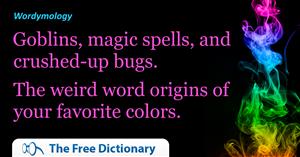A bouquet of 15 flower words.

Starting to see flowers on your socially-distant walks? Here's how 15 of them got their names.
Tulip Service
The tulip originated in the Middle East, but as it spread to other areas, its name shifted from the Persian lâle to the Ottoman Turkish tülbend—a piece of muslin used as a head covering—because a tulip was thought to look like a turban. (Incidentally, tülbend is also the basis of the word “turban.”) If you’re a big fan of tulips, consider yourself lucky that you didn’t live in the Netherlands in the 17th century: that was the height of “tulipomania,” during which single bulbs cost as much as several thousand dollars.
A Rose Tree by Any Other Name

The name “rhododendron” literally means “rose tree”... even though rhododendrons are 1) shrubs and 2) not roses. (The word “rose” may have been used in reference to the flowers’ color.) If you’re wondering where rhodon comes from, it refers to Rhodes, a Greek island where the rose was widely cultivated.
Hydration Station
For a plant like the azalea, its watering needs are right there in the name. Azaleas grow in dry soil, so they get their name from the Greek word for “dry”—azaleos.
“Hydrangea,” on the other hand, has a well-hydrated first syllable. The combination of the Greek words hudōr (“water”) and angeion (“vessel”) gives us “hydrangea,” although, in this case, the Greek name likely refers to the plant’s cup-shaped fruit, rather than its water preferences.
BFF: Best Friend Flowers

Want a flower named after you? Get you a friend like Carolus Linnaeus, aka the father of taxonomy! That’s how the name “alstroemeria” came about—it’s named for Linneaus’ pal, Swedish naturalist Baron Klas von Alstroemer.
The Dandelion King
Whether you think it’s dandy or not, there is a lion in the etymology of “dandelion.” The word comes from the Old French phrase dent de lion, which literally means “tooth of a lion,” referring to the flower’s deep-toothed leaves.
Somewhere Over the... Iris?
The colorful flower known as the iris gets its name from the Greek word for “rainbow.” “Iris” was also the name of a Greek goddess with a unique mode of transportation—she would travel along rainbows to bring messages from the gods to Earth.
(Those winged-sandals don't seem so cool now, huh, Hermes?)
A Double-Edged Sword

Thanks to its sword-shaped leaves, the gladiolus flower ultimately gets its name from the Latin word gladius, meaning “sword.” And these aren’t fighting words: gladius also gave us the word “gladiator.”
Garden-ia
Having a flower named after you is really a no-brainer when you’re a botanist and your last name is “Garden.” American botanist Alexander Garden put the “garden” in “gardenia.”
Mum’s the Word

The difficult-to-spell chrysanthemum gets its name from a very similar Greek word: khrusanthemon. This combines the Greek words khrusos (“gold”) and anthemon (“flower”) and likely refers to the color of many of its varieties. Not surprisingly, the shortening “mum” is commonly used in place of the full, tongue-twister name.
All Poin-Set
Heart set on learning about the poinsettia? Well, this common Christmas flower is named for Joel Roberts Poinsett, the US minister to Mexico—and amateur botanist on the side. He found his eponymous plant in Mexico in 1828, sent samples of it back to the US, and things blossomed from there.
The Name Game

In addition to poinsettia, gardenia, and alstroemeria, there’s also “zinnia” (named for German botanist Johann Gottfried Zinn), “dahlia” (named after Swedish botanist Anders Dahl), “magnolia” (named after French botanist Pierre Magnol), and “bougainvillea” (in honor of French navigator Louis Antoine de Bougainville), just to name a few. Apparently, there’s no need to personally know Linnaeus to get a flower named after you!
Spring has sprung, so hit the share button and bestow some of these virtual blooms upon your friends!
Get all volumes of The Farlex Grammar Book in paperback or eBook.

